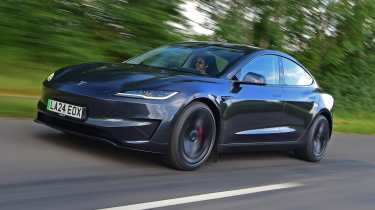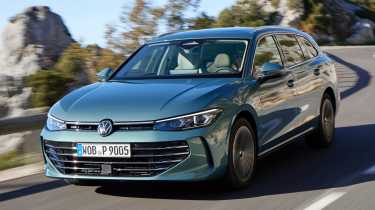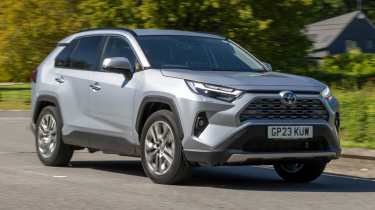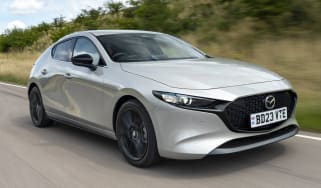'Luxury car' tax grab to hit 70% of EVs, fuelling calls for exemption
New Labour Government urged by UK motor industry to address concerns of potential EV purchasers and boost uptake of electric vehicles among private buyers by easing tax burden

The UK motor industry has called for the new Labour Government to exempt electric cars from the so-called ‘luxury-car’ tax before they become liable next year. The news comes as Auto Express reveals that almost a third of new cars registered in 2023 were liable for the Vehicle Excise Duty (VED) surcharge.
Paid annually over and above the standard £190 VED rate in years two to five of ownership, the luxury-car tax was increased from £390 per year in 2023 to £410 in 2024. We submitted a Freedom of Information request to the DVLA and were told that 601,978 (roughly 31 per cent) of all cars first registered in 2023 will be liable for the additional VED supplement this year, showcasing not only the far-reaching nature of the surcharge, but also the inflated prices of new cars.
It means the government is set to rake in an extra £250million in luxury-car tax charges from last year’s new-car sales alone. As a result, over the next four years in which the VED surcharge is applicable, 2023’s additions to the vehicle parc will net the government around £1 billion.
If you look at the UK’s fleet as a whole, things are even more shocking; the DVLA says that almost 1.9 million vehicles on
the road currently qualify for the additional VED, meaning that the total revenue from the luxury-car tax could be as much as £769,000,000 – or three quarters of a billion pounds – this year alone.
This tax take will only continue to increase, given that the Society of Motor Manufacturers and Traders (SMMT) estimates that in 2025 – when the exemption for electric and other zero-emission vehicles ends – seven in 10 EVs sold will be liable, thus injecting even more cash into the government’s pockets. With roughly 315,000 EVs registered in 2023, this figure could mean the equivalent of £129million per year, or even more if EVs’ market share continues to grow.
Speaking exclusively to Auto Express, the SMMT’s chairman Mike Hawes said: “Next year’s planned changes to extend the VED expensive car supplement to EVs will see a significant portion of these zero-emission vehicles classed as ‘luxuries’, right when manufacturers are mandated by law to increase the proportion they sell.”
“We need a fairer tax system that encourages drivers to make the switch,” he went on, “instead of punishing them with a tax bill for fulfilling the green goals shared by government, industry and society.”
The SMMT has called on the government to class electric cars as ‘essential’ and therefore not applicable for the additional surcharge. Of course, it’s worth noting that EVs bought before April 2025 won’t be liable for the luxury tax, only those registered thereafter.
It’s clear why the industry wants EVs to be able to escape ‘luxury car’ classification, because it’s a potentially big disincentive to sales that are already struggling. Industry figures reveal that private uptake fell by almost 11 per cent in June, with less than one in five EVs bought privately – although some might say that manufacturers themselves are responsible for focusing on making EVs with excessively high price tags.
As well as this move on luxury-car tax, the SMMT is also calling for VAT on EVs be halved to 10 per cent for three years. According to the trade body, this would not only make buying a brand-new electric car more affordable – it would cut the price of a Tesla Model Y, for example, by around £5,000 – but it could also result in as many as 300,000 additional EVs on our roads by the end of the designated period.
Hawes told us: “The private consumer market continues to shrink against a difficult economic backdrop, but with the right policies in place, the next government can re-energise the market and deliver a faster, fairer zero-emission transition.”
Another request from the SMMT is for Labour to slash VAT on public charging to just five per cent – mirroring that on domestic electricity. Such a reduction in sales tax has been lauded as a “fairer” move that “would support ZEV uptake and send the right message to consumers.”
However, we’re unlikely to hear anything until the next Budget, which Chancellor Rachel Reeves is likely to set out this autumn.
Luxury tax winners
Buyers can still get change from £40k with these excellent options.

If electric cars succumb to the VED surcharge next year, the Tesla Model 3 could be one of the most prudent ways to avoid it. Starting at just a tenner shy of £40,000, the Tesla Model 3 RWD is packed with tech and can do over 300 miles on a single charge. Just don’t pick any colour except white, because this will push you over the VED threshold.

Proof that premium doesn’t have to have a luxury price tag, the Volvo XC40 is a practical, comfortable and desirable family SUV. For less than £40k, you can bag a B4 Plus model with the 194bhp mild-hybrid petrol engine, as well as an expanded list of standard kit featuring posh suede and leatherette upholstery, and safety tech like blind-spot monitoring.

The Volkswagen Passat has recently undergone a significant overhaul, and entry-level Life versions manage to sneak in below the £40k mark. Despite being base models, these cars still look great and come fully loaded with equipment including tri-zone climate control, a 12.9-inch touchscreen, and heated and massaging front seats.

If you need an SUV that majors on fuel efficiency and space, look no further than the Toyota RAV4. For just a whisker under £40k, you’ll have to be content with an entry-level Design model painted in ‘Urban Khaki’. Still, that’s better than basic white, while even this edition gets all the equipment you’d need and is pretty good to drive.
Luxury tax losers
At just over £40k, these attractive new cars will incur the luxury car tax.

The Alfa Romeo Giulia is arguably one of the best-looking saloon cars on sale in the UK, but following a recent facelift, even the base Sprint model comes in at £600 over the £40k mark. That’s a shame, because all Giulias get a punchy 276bhp petrol engine and glorious metal gearshift paddles behind the steering wheel.

The Renault Scenic starts from under £40,000, but this only nets you the ‘Comfort Range’ model with a 260-mile range. While this should be fine for the school run and popping to the shops, many buyers may prefer the £40k+ ‘Long Range’ with its 379-mile maximum and more potent electric motor if they plan to go on the motorway frequently.
Kia Sportage PHEV

The hugely popular Kia Sportage is available in petrol, hybrid and plug-in hybrid form. It’s the latter you need to be wary of, because although a base model sets you back just under £30k, the PHEV is over £40k. If you must have a plug-in hybrid SUV, the mechanically similar Hyundai Tucson starts from just over £39k, dodging the luxury-car tax.
Vauxhall Astra GSe

We never thought we’d see the day when a Vauxhall Astra would cost over £40,000, but the plug-in hybrid GSe
is proof of how inflation is a growing problem. Despite its plush Alcantara upholstery and long kit list, the GSe can’t escape the fact that it’s ‘only’ an Astra and therefore doesn’t seem an appropriate subject for a ‘luxury’ tax.
Should electric cars be exempt from the luxury car tax? Let us know your thoughts in the comments section...




